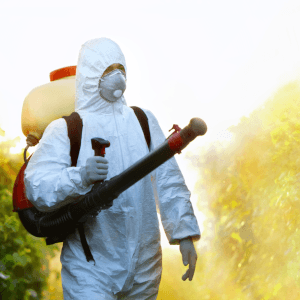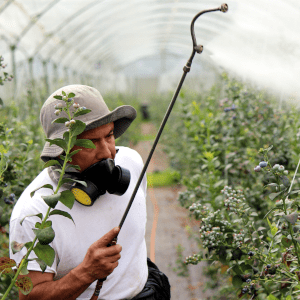 A new study published in Frontiers in Cancer Control and Society found an association between pesticides and numerous cancer types which the researchers described as comparable to the risk associated with smoking regarding some types of cancers:
A new study published in Frontiers in Cancer Control and Society found an association between pesticides and numerous cancer types which the researchers described as comparable to the risk associated with smoking regarding some types of cancers:
The researchers discovered the association via a systematic review of county-wide pesticide data, cancer incidence data and data involving smoking, total population, agricultural land use and the Social Vulnerability Index.
How Pesticides Impact Cancer Rates
The researchers found that pesticide use is associated with an increased risk of developing the following cancer types – an increased risk comparable to the risk associated with smoking regarding some types of cancer:
- Non-Hodgkin lymphoma
- Leukemia
- Pancreatic cancer
- Lung cancer
- Colon cancer
- All cancers combined
The researchers noted that exposure to pesticides has been linked with numerous harmful effects on human health, including altered immune function, a higher risk of various cancers, and Parkinson’s disease. The researches noted that glyphosate, the active ingredient in Roundup, is considered a probable carcinogen by the International Agency for Research on Cancer. The researchers also noted that there is some evidence, especially regarding studies done on animals, that other pesticides, such as tetrachlorvinphos, diazinon, malathion and parathion, can increase cancer risk. The researchers noted that 12 out of 30 pesticides which are tracked in the Agricultural Health Study have been linked with:
- Leukemia
- Multiple myeloma
- Colon cancer
- Pancreatic cancer
- Lung cancer
- Prostate cancer
How Pesticide Exposure Compares to Smoking
The researchers actually found that exposure to pesticides, including occupational exposure to pesticides, is associated with a higher risk of non-Hodgkin lymphoma, leukemia and bladder cancer than is smoking.
The researchers found that pesticide exposure, including chronic pesticide exposure, is associated with 154.1 percent more cancer cases than is smoking.
The researchers also found that pesticide exposure is associated with 19.3 percent more cases of bladder cancer than is smoking, and that pesticide exposure is associated with 21 percent more cases of leukemia than is smoking.
 The researchers found that smoking causes 3.4 percent more pancreatic cancer than pesticide exposure, and 73 percent more colon cancer. They also found that smoking is associated with a 324.8 percent higher lung cancer risk than pesticide exposure.
The researchers found that smoking causes 3.4 percent more pancreatic cancer than pesticide exposure, and 73 percent more colon cancer. They also found that smoking is associated with a 324.8 percent higher lung cancer risk than pesticide exposure.
The researchers found that human exposure to pesticides has a significant impact upon the rates of all types of cancers evaluated in the study.
Who Is At Risk?
The researchers found that farmers and farm workers are not the only people at risk. The researchers found that anybody who lives near farms or any other areas with pesticide exposure could be impacted.
Because pesticide use is so widespread, just about everyone has a higher risk of cancer due to its usage.
Children, in particular, are at risk of developing cancer from pesticide exposure. For example, girls exposed to DDT before they reach puberty are five times more likely to develop breast cancer in adulthood, and when children are exposed to DDT while in the womb their breast cancer risk is quadrupled. When a parent suffers pesticide exposure before their child is conceived, the child’s risk of cancer increases. Studies demonstrate that exposure to pesticides during pregnancy and childhood increases childhood cancer risks.
Do Pesticides on Food Cause Cancer?
A doctor at an Ohio State cancer center said that no conclusive research or evidence exists that eating non-organic vegetables and fruits increases cancer risks.
A 2021 study found that pesticide exposure via the eating of vegetables and fruits is not associated with a higher risk of cancer.
However, a 2021 study found that exposure to pesticides via one’s diet plays a “potential role” in breast cancer risk.
Cancers Caused by Pesticides and Herbicides
The researchers found associations between pesticide exposure and a higher risk of developing:
- Non-Hodgkin lymphoma
- Leukemia
- Pancreatic cancer
- Lung cancer
- Colorectal cancer
- All cancers combined
Chemicals can cause cancer in numerous ways, including disruption of hormones, DNA damage, tissue inflammation and genes being turned off or on.
Pesticide applicators and farmers see more prostate cancer risk. Women working with pesticides see higher ovarian cancer rates. Farm women and cropduster pilots see higher skin cancer rates.
A 2022 study found that prenatal exposure to acephate, bromacil, pymetrozine and kresoxim-methyl is associated with a higher risk of developing retinoblastoma, a rare eye cancer. A researcher involved in the study said regulators like the Environmental Protection Agency should limit pesticide use to reduce risks of cancer.
A 2009 study, Agricultural Pesticide Use and Pancreatic Cancer Risk in the Agricultural Health Study Cohort, found that pendimethalin and EPTC might share an association with pancreatic cancer.
A 2020 study found an association between renal cell carcinoma and paraquat, cyanazine, atrazine, 2,4,5-T, chlordane and chlorpyrifos.
Am I Eligible for a Lawsuit?
 Numerous lawsuits allege that people developed non-Hodgkin lymphoma after being exposed to the herbicide Roundup, and that people developed Parkinson’s disease after being exposed to the herbicide paraquat.
Numerous lawsuits allege that people developed non-Hodgkin lymphoma after being exposed to the herbicide Roundup, and that people developed Parkinson’s disease after being exposed to the herbicide paraquat.
If you or a loved one developed non-Hodgkin lymphoma after being exposed to Roundup, or developed Parkinson’s disease after being exposed to paraquat, you may be eligible to file a lawsuit seeking financial compensation for medical bills, lost wages, loss of earning capacity, pain, suffering, wrongful death and more.
Contact us today for a free consultation. We won’t charge you any fee to handle your Roundup or paraquat case until and unless we recover compensation for you, and we can get you to doctors who will treat your NHL or PD without charging you until your case is over.

